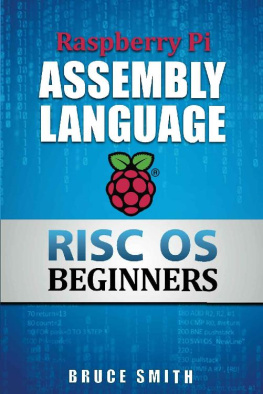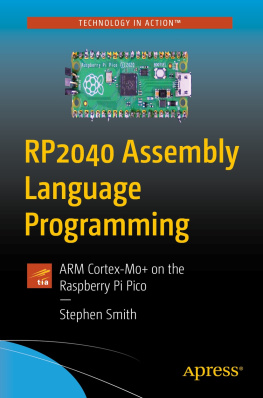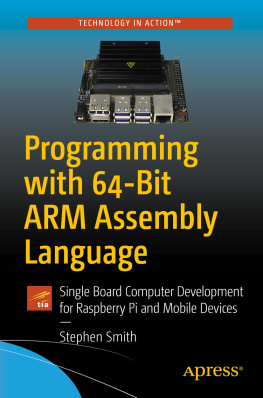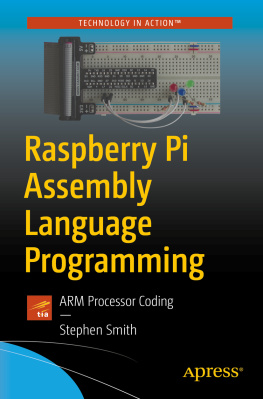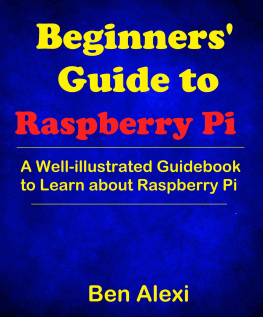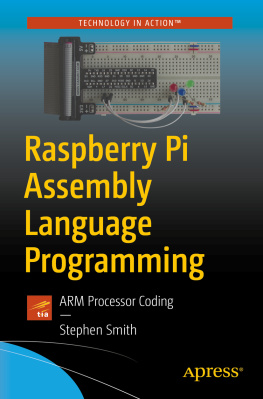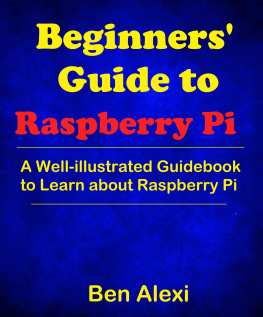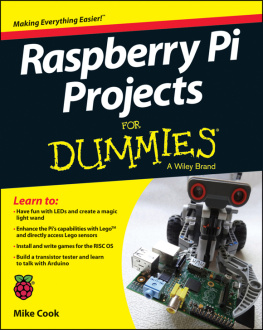Bruce Smith - Raspberry Pi Assembly Language RISC OS Beginners (Hands On Guide)
Here you can read online Bruce Smith - Raspberry Pi Assembly Language RISC OS Beginners (Hands On Guide) full text of the book (entire story) in english for free. Download pdf and epub, get meaning, cover and reviews about this ebook. year: 2014, publisher: self-publ., genre: Computer. Description of the work, (preface) as well as reviews are available. Best literature library LitArk.com created for fans of good reading and offers a wide selection of genres:
Romance novel
Science fiction
Adventure
Detective
Science
History
Home and family
Prose
Art
Politics
Computer
Non-fiction
Religion
Business
Children
Humor
Choose a favorite category and find really read worthwhile books. Enjoy immersion in the world of imagination, feel the emotions of the characters or learn something new for yourself, make an fascinating discovery.
- Book:Raspberry Pi Assembly Language RISC OS Beginners (Hands On Guide)
- Author:
- Publisher:self-publ.
- Genre:
- Year:2014
- Rating:3 / 5
- Favourites:Add to favourites
- Your mark:
- 60
- 1
- 2
- 3
- 4
- 5
Raspberry Pi Assembly Language RISC OS Beginners (Hands On Guide): summary, description and annotation
We offer to read an annotation, description, summary or preface (depends on what the author of the book "Raspberry Pi Assembly Language RISC OS Beginners (Hands On Guide)" wrote himself). If you haven't found the necessary information about the book — write in the comments, we will try to find it.
Bruce Smith: author's other books
Who wrote Raspberry Pi Assembly Language RISC OS Beginners (Hands On Guide)? Find out the surname, the name of the author of the book and a list of all author's works by series.
Raspberry Pi Assembly Language RISC OS Beginners (Hands On Guide) — read online for free the complete book (whole text) full work
Below is the text of the book, divided by pages. System saving the place of the last page read, allows you to conveniently read the book "Raspberry Pi Assembly Language RISC OS Beginners (Hands On Guide)" online for free, without having to search again every time where you left off. Put a bookmark, and you can go to the page where you finished reading at any time.
Font size:
Interval:
Bookmark:
Raspberry Pi Assembly Language RISC OS Beginners
Raspberry Pi
Assembly Language RISC OS Beginners
Hands On Guide
Bruce Smith
ISBN-13: 978-0-9923916-3-8
First edition: February 2014 [0001]
Editor: Alan Ford Edits
Cover: Sumit Shringi, Graphic Designer (Book Cover-Design)
Typeset in 11 on l2pt Garamond by BSB using Serif PagePlus x6
All Trademarks and Registered Trademarks are hereby acknowledged.
Within this Hands On Guide the term BBC refers to the British Broadcasting Corporation. Raspberry Pi and the Raspberry Pi logos are registered trademarks of the Raspberry Pi Foundation.
Raspberry Pi Assembly Language: RISC OS Beginners Hands On Guide is not endorsed by the Raspberry Pi Foundation.
All rights reserved. No part of this book (except brief passages quoted for critical purposes) or any of the computer programs to which it relates may be reproduced or translated in any form, by any means mechanical electronic or otherwise without the prior written consent of the copyright holder.
Disclaimer: Whilst every effort has been made to ensure that the information in this publication (and any programs and software) is correct and accurate, the author and publisher can accept no liability for any consequential loss or damage, however caused, arising as a result of the information printed in this book and on any associated websites. Because neither BSB nor the author have any control over the way in which the contents of this book is used, no warranty is given or should be implied as to the suitability of the advice or programs for any given application. No liability can be accepted for any consequential loss or damage, however caused, arising as a result of using the programs or advice printed in this book.
Published by BSB www.brucesmith.info.
About the Author
Bruce Smith purchased his first computer an Acorn Atom in 1980. He was immediately hooked, becoming a regular contributor to the mainstream computer press including Computing Today and Personal Computer World. With the arrival of the BBC Micro his magazine work expanded into books and his 1982 title Interfacing Projects for the BBC Micro (published by Addison Wesley) has become regarded as a classic of the time as the first book showing home users how to connect the computer to the outside world. He was one of the first to write about the ARM chip when it was released on the Acorn Archimedes in 1987.
Well over 100 books later Bruce has written about all aspects of computer use. His friendly, lucid style of writing caused one reviewer to write, This is the first computer book I have read in bed for pleasure rather than to cure insomnia! Bruces books have been translated into many languages and sold across the world.
Bruce also writes about sport and his publishers have included BBC Books, Virgin Books, Rough Guides, Headline and Mainstream Publishing. He has been a regular contributor for BBC local and national radio and has appeared on Channel 4s The Big Breakfast and BBC World Service.
Follow Bruce on Twitter: @brucefsmith
www.brucesmith.info
Preface
This original edition of this book was published under the title Raspberry Pi Assembly Language Beginners. The original title seemed to create confusion as to which operating system it dealt with, especially after the launch of Raspberry Pi Assembly Language RASPBIAN Beginners, which was an introduction to the ARM using GCC on the Raspbian operating system and its various Linux incarnations.
I thought it was a good time to substantially revise and update the original text and take the opportunity to rename the booksince it well over a year oldto make it clear where its sits in Raspberry Pi distro hierarchy. This new release contains several new chapters that deal specifically with features supplied by the Raspberry Pi system-on-chip structure and expansion ports. This includes a look at the Floating Point co-processors and how to program the GPIO port.
It should be acknowledged that there are many ways to archive a particular outcome when programming in assembly language and especially within the RISC OS environment. I am rather old school in my approach to these matters and more of a traditionalist to the original RISC OS concepts.
The revision of this volume goes hand-in-hand with the release of Raspberry Pi RISC OS System Programming Revealed which could be considered a companion volume, especially if you wish to delve further into the working and operations of RISC OS . Note that a couple of chapters overlap between the two book, so please check the website at www.brucesmith.info if you are looking for specific information so as to ensure you do not double up.
Bruce Smith, Sydney, January 2014
###
1: Introduction
It didnt surprise me when, early in 2013, it was announced that the Raspberry Pi had sold one million units. And counting... It took me back more years decades even than I care to remember when it was announced that the BBC Micro had done the same. Both came out of businesses based in Cambridge in the UK and there were even more links between the two than you might imagine.
Both systems fascinated me and literally millions of other people. The first system took every last penny of my savings at the time, but the Raspberry Pi didnt even drain the cash in my wallet. But while the ticket price for each was vastly different, pretty much everything else about them was so familiar. Not least their ability to run a wide range of software and educational tools and how easy it was to connect external devices and control the outside world. I would suspect that most people who own one Raspberry Pi, actually own several.
For the first time since the BBC Micro there is an affordable and infinitely accessible system that just about anyone can use. Meanwhile, the PC and Mac have dominated the market and other more games-orientated boxes have been available. But none of these have impacted the technical home hobbyist user. The techsperts have had a variety of development boards to experiment and fiddle with, again mostly beyond the scope of the home hobbyist computer market. For the cost of a couple of music albums or new release DVD, the Raspberry Pi has changed all that. I wonder if the Raspberry Pi could be classed as the worlds first disposable computer?
Imagination Unlimited
One reason for the birth of the Raspberry Pi was to make it easy for people to take up programming, with the aid of a competitively priced computer system whose use was limited only by the users imagination. I hope this book will help many of you reading it realise that dream. In fact, it isn't a dream. It is a probability if you continue your way through the pages that follow a first step on a rewarding and educational pastime. And, who knows, you may become part of a new generation of computer programmers working at the sharp end of what is possible.
This book provides an introductory tutorial in writing assembly language on the Raspberry Pi and specifically using RISC OS. Assembly language generates machine code that can be run directly on your computer. I first learned to program assembly language on the Acorn Atom (the BBC Micros predecessor) and then on its successor (the Archimedes) the assembly language now used on the Raspberry Pi. If anything that proves that what you learn here should stand you in good step for many years to come. So it is a significant investment.
Start Experimenting
While this is not a book for the complete novice, you certainly do not require any experience with assembly language or machine code to be able to pick it up and start reading and experimenting. Programming experience would be beneficial and any structured language will have provided the groundwork for many of the fundamental concepts required.
Next pageFont size:
Interval:
Bookmark:
Similar books «Raspberry Pi Assembly Language RISC OS Beginners (Hands On Guide)»
Look at similar books to Raspberry Pi Assembly Language RISC OS Beginners (Hands On Guide). We have selected literature similar in name and meaning in the hope of providing readers with more options to find new, interesting, not yet read works.
Discussion, reviews of the book Raspberry Pi Assembly Language RISC OS Beginners (Hands On Guide) and just readers' own opinions. Leave your comments, write what you think about the work, its meaning or the main characters. Specify what exactly you liked and what you didn't like, and why you think so.

